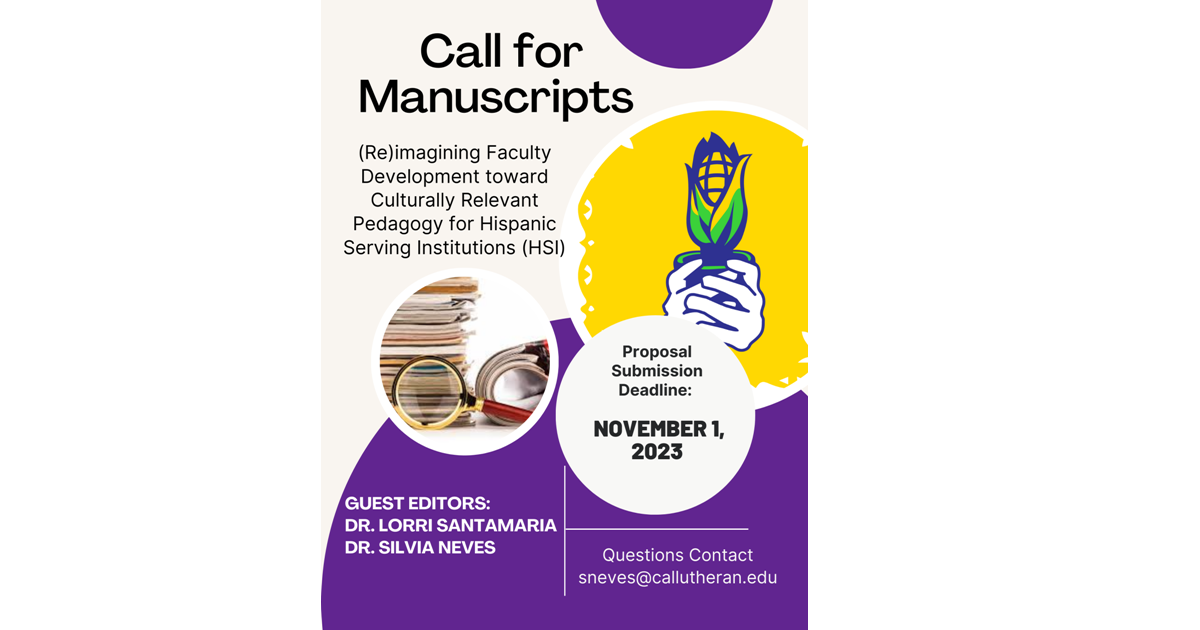(Re)imagining Faculty Development Toward Culturally Relevant Pedagogy for Hispanic Serving Institutions (HSI)
A special issue of Education Sciences (ISSN 2227-7102). This special issue belongs to the section "Higher Education".
Deadline for manuscript submissions: 12 May 2024 | Viewed by 174

Special Issue Editors
Interests: faculty development; culturally affirming pedagogies in higher education; diversity, equity, and inclusion in higher education
Interests: faculty development; Hispanic serving; Hispanic serving institutions; men of color in higher education
Interests: critical reading and writing; rhetorical theories; critical theories; advanced argumentation; teaching of writing
Special Issue Information
Dear Colleagues,
In the ever-evolving landscape of higher education, it is increasingly imperative for institutions, especially Hispanic-serving institutions (HSIs), to reimagine faculty development through a culturally responsive lens. This need arises for several compelling reasons.
Firstly, the composition of our student body is becoming progressively diverse. In 2021, a notable 54% of students in HSIs identified as Hispanic, and this percentage is projected to continue its upward trajectory. Consequently, faculty must be equipped to effectively cater to the evolving needs of this multifaceted student population.
Secondly, research consistently demonstrates that culturally responsive teaching significantly enhances student outcomes. For instance, a study revealed that such teaching methodologies contribute to narrowing the achievement gap between Black/Hispanic and White students, highlighting its critical role in educational equity.
Thirdly, embracing culturally responsive faculty development initiatives can foster a more inclusive and welcoming campus environment. When faculty members are attuned to and respectful of their students' diverse cultural backgrounds, they are better positioned to cultivate a learning environment where every student feels valued and respected.
As members of the CHESS network, we extend a warm invitation to you to submit proposals for an internationally peer-reviewed Special Issue in the journal of Education Sciences. This Special Issue's scope encompasses articles that:
- Delve into the shifting demographics of higher education and their implications for culturally responsive teaching and student outcomes;
- Review the research on culturally responsive teaching and its impact on student success;
- Propose strategies for cultivating culturally responsive pedagogy and enhancing student engagement;
- Share case studies from faculty members at HSIs who have successfully implemented culturally responsive pedagogy.
This Special Issue is poised to capture the interest of faculty, administrators, and researchers keen on enhancing the educational experiences of students at HSIs. Moreover, it will resonate with those passionate about the intersection of diversity, equity, and inclusion in higher education within the HSI context.
The suggested themes for this Special Issue encompass a wide spectrum, including but not limited to:
- Experiential learning;
- Student success in gateway courses;
- Engagement of students of color;
- Faculty interdisciplinary collaboration;
- Joint faculty learning communities;
- Grading for equity.
We earnestly invite your contribution to this Special Issue by submitting a proposal by November 1, 2023. We enthusiastically encourage co-author submissions and cross-institutional collaborations.
The proposal should encompass the following components within a concise 600-word limit:
- Introduction/rationale;
- Reference list;
- Theoretical framework (e.g., community cultural wealth, critical race theory, culturally relevant, sustaining, affirming pedagogy);
- Methodology (e.g., interdisciplinary and interpretive, qualitative, mixed methods);
- Data sources;
- Anticipated or actual results;
- Implications.
You will receive proposal acceptance notification via email by December 15, 2023. We look forward to your submission.
With warm regards,
Dr. Lorri J. Santamaría
Dr. Silvia Neves
Prof. Dr. Jolivette Mecenas
Guest Editors
Manuscript Submission Information
Manuscripts should be submitted online at www.mdpi.com by registering and logging in to this website. Once you are registered, click here to go to the submission form. Manuscripts can be submitted until the deadline. All submissions that pass pre-check are peer-reviewed. Accepted papers will be published continuously in the journal (as soon as accepted) and will be listed together on the special issue website. Research articles, review articles as well as short communications are invited. For planned papers, a title and short abstract (about 100 words) can be sent to the Editorial Office for announcement on this website.
Submitted manuscripts should not have been published previously, nor be under consideration for publication elsewhere (except conference proceedings papers). All manuscripts are thoroughly refereed through a double-blind peer-review process. A guide for authors and other relevant information for submission of manuscripts is available on the Instructions for Authors page. Education Sciences is an international peer-reviewed open access monthly journal published by MDPI.
Please visit the Instructions for Authors page before submitting a manuscript. The Article Processing Charge (APC) for publication in this open access journal is 1800 CHF (Swiss Francs). Submitted papers should be well formatted and use good English. Authors may use MDPI's English editing service prior to publication or during author revisions.
Keywords
- faculty collaboration
- curriculum design
- culturally relevant pedagogy
- faculty development
- engagement of students of color
- course redesign







